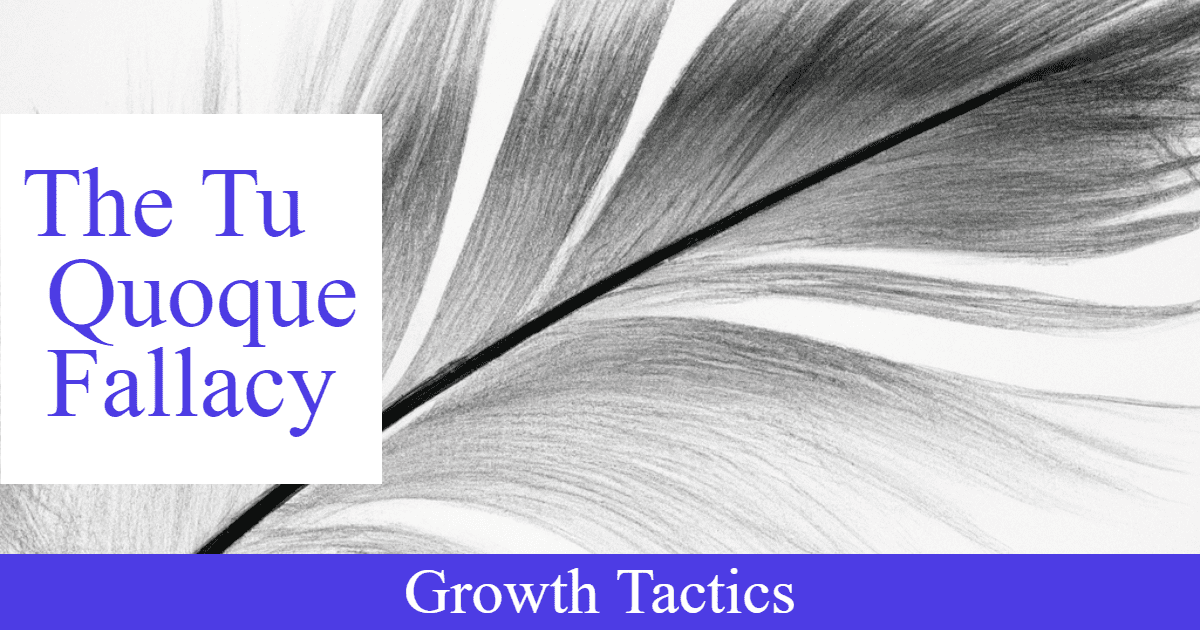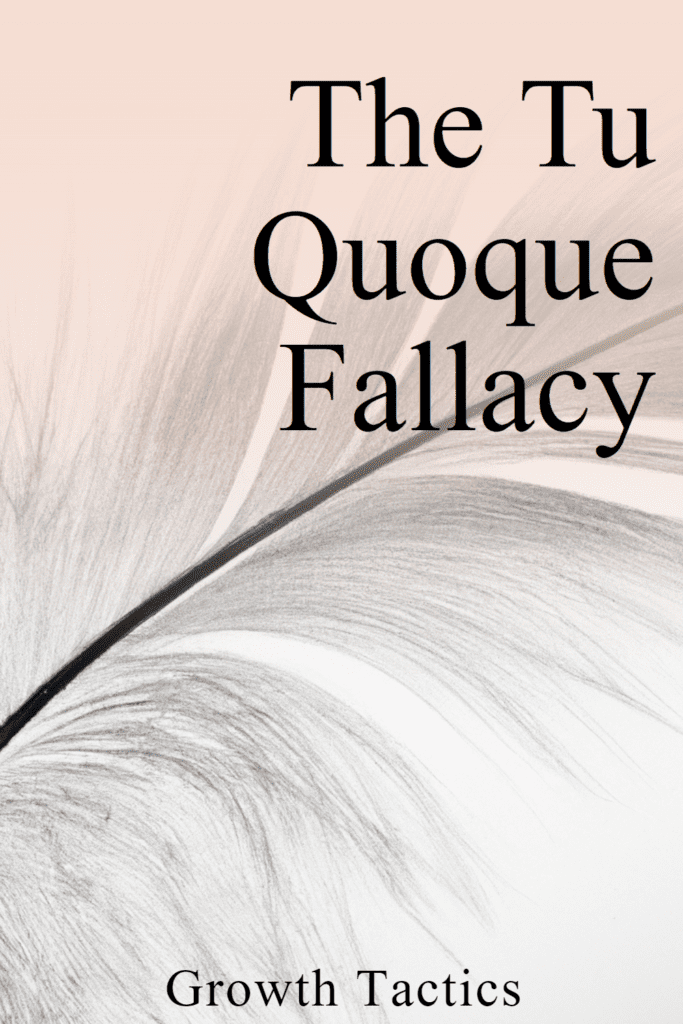The Tu Quoque fallacy is a common logical fallacy that often occurs in arguments and debates. In this blog post, we will explore the tu quoque fallacy, and its definition, and provide examples to help you understand and identify this fallacious reasoning. Whether you’re new to logical fallacies or looking to enhance your critical thinking skills, this article is worth reading to avoid falling into the trap of the tu quoque fallacy.
What is the Tu Quoque Fallacy?
The Tu Quoque fallacy, also known as the “appeal to hypocrisy,” is an argumentative fallacy wherein a person attempts to discredit an opponent’s argument by pointing out the opponent’s inconsistency or hypocrisy. Instead of addressing the argument’s validity, the focus shifts to the opponent’s past actions or choices. By doing so, the person attempts to undermine the opponent’s credibility rather than engaging with the argument directly.
Defining the Fallacy: Tu Quoque
The term “tu quoque” is a Latin phrase that translates to “you also.” In this context, the fallacy arises when someone claims, “You cannot make that argument because you have also acted or believed in a similar way.” The tu quoque fallacy occurs when an accusation of hypocrisy or inconsistency is used to divert attention from the argument at hand in an attempt to invalidate it.
Illuminating Examples of the Tu Quoque Fallacy
Examples of the tu quoque fallacy are incredibly prevalent and can arise in various situations. Here are a few examples to help you recognize the fallacy in action:
- A parent tells their child not to smoke, citing the harmful effects of smoking. The child responds by saying, “But you smoked when you were young, so why can’t I?”
In this example, the child is committing the tu quoque fallacy by attempting to discredit the parent’s advice by pointing out their past actions. The child’s smoking habits remain harmful regardless of whether or not the parent smoked in the past.
- In a political debate, one candidate accuses the other of being greedy and beholden to special interests. The other responds by saying, “But you’ve also accepted large campaign donations from corporations.”
In this example, the second candidate is committing the tu quoque fallacy by diverting attention from the initial accusation. The validity of the accusation remains separate from the second candidate’s past actions, and thus, the fallacy is being committed.
- In a court case, a defendant accuses the prosecution of being biased and unfair. The prosecution responds by pointing out the defendant’s criminal record.
In this example, the prosecution is committing the tu quoque fallacy by diverting attention from the argument at hand. The defendant’s criminal record does not impact the ongoing case’s validity, and thus, the prosecution is committing the tu quoque fallacy.
Remember that accusations of hypocrisy or inconsistency do not negate the validity of an argument. Instead, they serve as distractions that detract from the substance of the argument. By recognizing the fallacy, you can engage in more productive and meaningful discussions.
Recognizing the Tu Quoque Fallacy in Arguments
Identifying the tu quoque fallacy in arguments can be challenging, as it often disguises itself as a valid response. However, some signs indicate the presence of this fallacy. Look for accusations of hypocrisy, references to past actions, or attempts to divert attention from the argument under discussion. By recognizing these indicators, you can avoid falling into the trap of the tu quoque fallacy.
The Ad Hominem Connection
The tu quoque fallacy is closely related to the ad hominem fallacy. While the ad hominem fallacy attacks the character or personal attributes of the opponent, the tu quoque fallacy specifically targets their inconsistency or hypocrisy. Both fallacies aim to discredit the opponent rather than engage with the argument itself, but they do so in different ways.
Hypocrisy as a Type of Ad Hominem
Hypocrisy is a common type of ad hominem attack often used in the context of the tu quoque fallacy. By highlighting an opponent’s past actions that contradict their current argument, the accuser attempts to undermine the opponent’s credibility. However, it is important to remember that an opponent’s past actions do not invalidate the argument itself. The focus should remain on the validity and soundness of the argument being presented.
Challenging the Tu Quoque Fallacy: Valid Argumentation
Challenging the tu quoque fallacy requires employing valid argumentation techniques to redirect the discussion back to the merits of the argument. Here are some strategies you can use to effectively counteract the tu quoque fallacy:
- Stay Focused on the Argument: Avoid getting drawn into personal attacks or discussions of the opponent’s past actions. Acknowledge their accusations, but firmly redirect the conversation back to the substance of the argument being made. Emphasize the importance of addressing the argument itself rather than attacking the person presenting it.
- Address the Validity of the Argument: Evaluate the argument on its own merits, regardless of any perceived inconsistencies or hypocrisy of the opponent. Respond by providing evidence, logical reasoning, and counterarguments to support the validity of your position. Focus on the strength of your argument rather than engaging in irrelevant discussions.
- Highlight Logical Fallacies: Explain that the tu quoque fallacy is a logical fallacy that distracts from the core of the argument. Point out that attacking someone’s past actions does not automatically render their argument invalid. By identifying and naming the fallacy, you bring attention to the flawed reasoning being employed.
- Maintain a Respectful Tone: It’s important to challenge the tu quoque fallacy while maintaining a respectful and constructive tone. Keep the focus on the argument rather than resorting to personal attacks or defensive responses. This can help create a more productive and balanced discussion.
- Educate Others About Logical Fallacies: Take the opportunity to educate others about logical fallacies, including the tu quoque fallacy. By fostering a general understanding of these fallacies, you can help create a more logical and rational discourse.
Remember that the key to challenging the tu quoque fallacy lies in addressing arguments based on their own merits rather than engaging in personal attacks or distractions. By employing these strategies, you can effectively counteract the tu quoque fallacy and steer the discussion back to a more productive and rational path.
The Importance of Logical Reasoning and Fallacy Awareness
Understanding logical fallacies, such as the tu quoque fallacy, is crucial for effective critical thinking and clear communication. By being aware of fallacies, you can better evaluate arguments, recognize manipulative tactics, and present your own arguments with clarity and coherence. Logical reasoning helps us navigate complex discussions and ensures that arguments are founded on sound principles and evidence.
The Impact of the Tu Quoque Fallacy in Everyday Life
The tu quoque fallacy can have a significant impact on various aspects of our lives, including personal relationships, politics, and public discourse. Recognizing this fallacy enables us to engage in more productive conversations, break the cycle of fallacious reasoning, and foster a culture of critical thinking. By addressing arguments on their merits rather than attacking individuals, we can progress toward more meaningful and constructive discussions.
Exposing Fallacious Arguments: Strategies for Arguing Effectively
In conclusion, understanding and identifying the tu quoque fallacy is essential for effective communication and critical thinking. By recognizing the presence of this fallacy, we can challenge fallacious arguments, engage in more productive discussions, and promote logical reasoning. Remember, the validity of an argument should not be undermined by focusing on an opponent’s past actions. Stick to the facts, evaluate evidence, and present your arguments with clarity and coherence.


